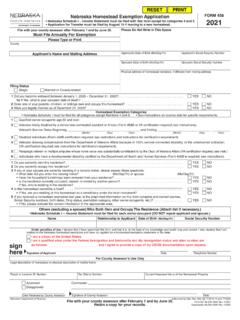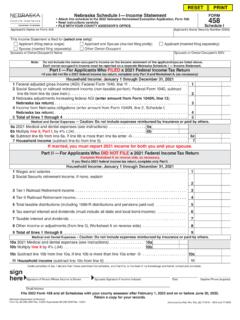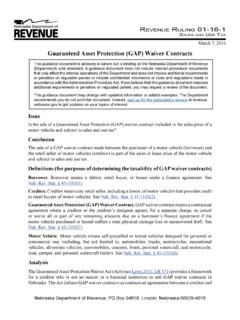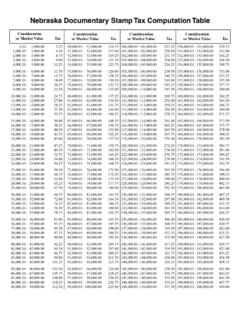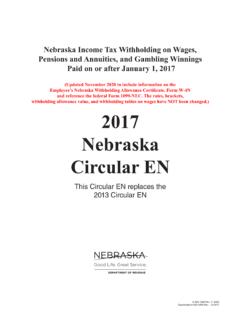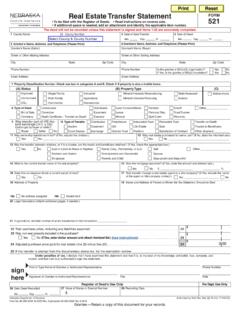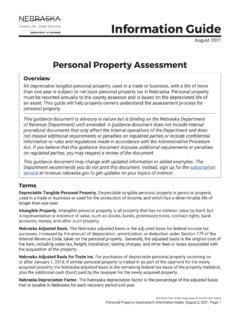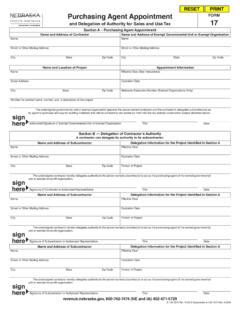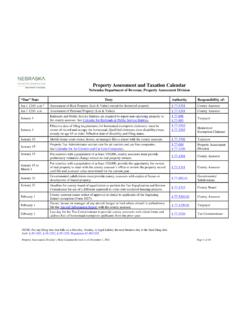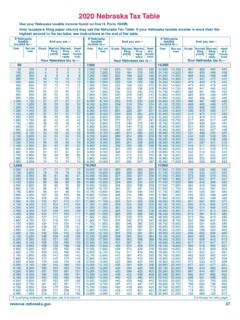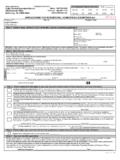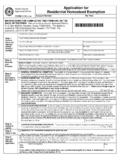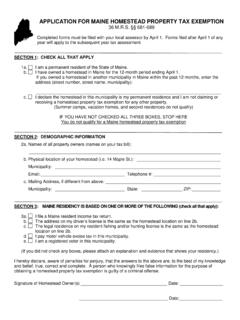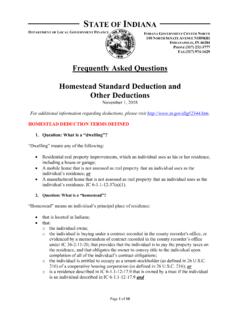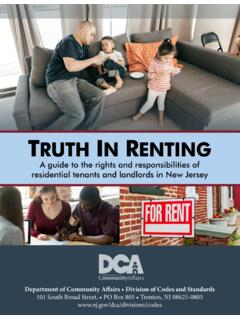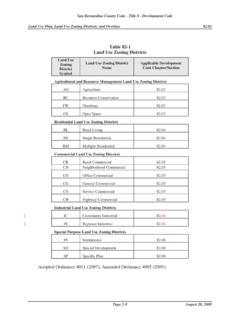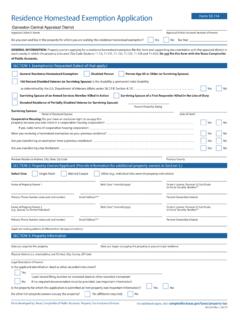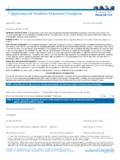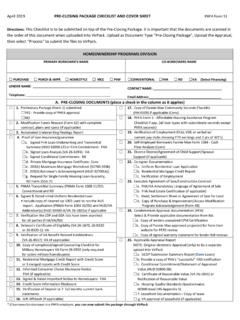Transcription of February 2021 Nebraska Homestead Exemption
1 Nebraska Homestead Exemption Information Guide, February 2, 2021, Page 1 Information GuideFebruary 2021 OverviewThe Nebraska Homestead Exemption program is a property tax relief program for six categories of homeowners: 1. Persons over age 65 (see page 4); 2. Veterans totally disabled by a nonservice-connected accident or illness (see page 7); 3. Qualified disabled individuals (see page 2 and page 7); 4. Qualified totally disabled veterans and their widow(er)s (see page 7); 5. Veterans whose home was substantially contributed to by the Department of Veterans Affairs (DVA) and their widow(er)s (see page 7); or 6. Individuals who have a developmental disability (see page 2 and page 7).There are income limits and Homestead value requirements for categories 1, 2, 3, and 6. The income limits are on a sliding scale. There are no income limits and Homestead value requirements for categories 4 and 5.
2 The State of Nebraska reimburses counties and other governmental subdivisions for the reduction in tax revenue as a result of approved Homestead exemptions. This guidance document is advisory in nature but is binding on the Nebraska Department of Revenue (DOR) until amended. A guidance document does not include internal procedural documents that only affect the internal operations of DOR and does not impose additional requirements or penalties on regulated parties or include confidential information or rules and regulations made in accordance with the Administrative Procedure Act. If you believe that this guidance document imposes additional requirements or penalties on regulated parties, you may request a review of the guidance document may change with updated information or added examples. DOR recommends you do not print this document. Instead, sign up for the subscription service at to get updates on your topics of Rev.
3 2-2021 Supersedes 96-299-2009 Rev. 2-2020 Nebraska Homestead ExemptionNebraska Homestead Exemption Application, Form 458 For filing after February 1, 2021, and by June 30, Homestead Exemption Information Guide, February 2, 2021, Page 2 TermsDeductible Medical and Dental Expenses. Deductible medical and dental expenses are those incurred and paid by the claimant, spouse, and any owner/occupant. These expenses must be more than 4% of the calculated household income prior to deducting the medical expenses. The allowed medical and dental expenses are the out-of-pocket (non-reimbursed) costs of: v Health insurance premiums (employer-sponsored health insurance plans excluded); and v Goods and services that restore or maintain health which were purchased from a licensed health practitioner or licensed health care facility. Insulin and prescription medicine may be included, but nonprescription medicine cannot be included.
4 IRS Publication 502 contains more information on medical and dental A Homestead is the residence or mobile home, and up to one acre of land surrounding it, actually occupied by a person who is the owner of record from January 1 through August 15 in each year. v Property held in the name of an entity such as a corporation, partnership, or limited liability company will not qualify. v If a natural disaster occurs between January 1 and August 15 of the year the Homestead Exemption Application was filed, which renders the residence or mobile home uninhabitable, the displaced applicant is still eligible if the applicant intends to rebuild or repair the Homestead . Directive 15-3, Homestead Exemption Applications Following a Natural Income. Household income is the total of the previous year s federal adjusted gross income (AGI), plus: v Social Security or railroad retirement income that was not included as taxable income in the AGI; v Any Nebraska adjustments increasing federal AGI (line 12 of the Nebraska Individual Income Tax Return, Form 1040N, filed when reporting Nebraska income tax); and v Interest and dividends from Nebraska and its subdivisions obligations; of the claimant, spouse, and all other persons who own and occupy the Homestead ; minus deductible medical expenses.
5 Filing Status. Marital status information is required to determine the income limits used to calculate the percentage of relief, if any. Marital status may be either married or single. v Use the married status if a Nebraska individual income tax return was filed using one of the married statuses, or would have been filed as married if a tax return was required. v Closely related means the applicant is either a brother, sister, parent, or child of another owner-occupant. Closely related applicants are subject to the same income criteria as married applicants. v Use the single status if a Nebraska individual income tax return was filed using the single or head of household status, or would have been filed as single or head of household if a tax return was An owner-occupant is the owner of record or surviving spouse in the current year only; the occupant purchasing and in possession of a Homestead under a land contract; one of the joint tenants, or tenants in common; or a beneficiary of a trust that has an ownership interest in the Disabilities for Individuals.
6 The qualifying disabilities are: v A permanent physical disability and loss of the ability to walk without the use of a mechanical aid (braces, crutches, cane, walker, or wheelchair) or prosthetic device (Category 3); v Amputation of both arms above the elbow (Category 3); v A permanent partial disability of both arms in excess of 75% (Category 3); or v A developmental disability (Category 6) as defined in Homestead Exemption Information Guide, February 2, 2021, Page 3 Note: An individual who qualifies for Social Security disability does not automatically qualify for the Nebraska Homestead A veteran is a person who has been on active duty in the armed forces of the , or a citizen of the at the time of service with military forces of a government allied with the , during the following date ranges: v World War II, December 7, 1941 to December 31, 1946; v Korean War, June 25, 1950 to January 31, 1955; v Vietnam War, February 28, 1961 to May 7, 1975 (in the Republic of Vietnam); v Vietnam War, August 5, 1964 to May 7, 1975; v Lebanon, August 25, 1982 to February 26, 1984; v Grenada, October 23, 1983 to November 23, 1983; v Panama, December 20, 1989 to January 31, 1990.
7 V Persian Gulf War beginning August 2, 1990; and v Global War on Terror beginning September 14, veteran must have received an honorable discharge or general discharge under honorable Exemption Timeline v January. DOR sends pre-printed Homestead Exemption Applications (applications) to the county assessors. v February 1. County assessors make the applications available and mail the pre-printed applications to prior-year applicants. It is the applicant s responsibility to secure the application and required Schedules, and to timely file them with the county assessor. Failure to timely file the properly completed application will constitute a waiver of the Homestead Exemption for that year. v February 2 through June 30. Annual filing period for applications. v July 20. Late applications are due if the county board has extended the deadline for the county.
8 V August 1. County assessors must forward approved applications to DOR. v September 1. The county assessor must let DOR know the average residential value of a single family home in the county. v October. DOR sends letters to all those qualifying for less than a 100% Exemption . No letter is sent to those qualifying for a 100% Exemption (see December). v November 1. DOR must send approved and denied rosters to the county assessors. v December. All applicants, including those qualifying for a 100% Exemption , will see tax and Homestead Exemption amounts reflected on the tax statements sent by county treasurers. Mortgage companies receive a copy of the tax statement indicating any Homestead Exemption granted. Monthly tax escrow payment amounts will be adjusted as applicable by mortgage companies. Homestead Exemption Categories The categories for the Homestead exemptions are: 1.
9 Persons over age 65; 2. Veterans totally disabled - nonservice connected; 3. Certain disabled individuals (See page 2 for list of qualifying disabilities); 4. Veterans totally disabled - service connected, and their widow(ers); 5. Veteran whose home was contributed to by the DVA, and their widow(ers); and 6. Individuals who have a developmental disability as defined in Neb. Rev. Stat. 83-1205. A Form 458 must be filed with the county assessor after February 1 and by June 30 each year for all categories. A Schedule I must also be filed for Categories 1, 2, 3, and 6. Failure to properly file within this timeframe (with certain limited exceptions) will result in disapproval of the Homestead Exemption for the Homestead Exemption Information Guide, February 2, 2021, Page 4 The following chart gives an overview of the requirements for each category.
10 Categories123456 Ownership and Occupancy Form 458 YesYesYesYesYesYesAnnual Schedule IYesYesYesNoNoYesWidow(er) EligibleNoNoNoYesYesNoFirst Time Form 458B /DHHS or VA CertificateNoYes 458B or VAYes 458 BYes - VAYes - VAYes 458B (DHHS)Annual Form 458B /DHHS or VA CertificateNoNo (County or Tax Commissioner s Discretion)No (County or Tax Commissioner s Discretion)No (County or Tax Commissioner s Discretion)No (County or Tax Commissioner s Discretion)No (County or Tax Commissioner s Discretion)Maximum Exempt AmountYes - 100%Yes - 120%Yes - 120%NoNoYes - 120%Maximum ValueYes - 200%Yes - 225%Yes - 225%NoNoYes - 225%Age 65 prior to January 1 YesNoNoNoNoNoIncome RequirementsYesYesYesNoNoYesPersons Over Age 65 (Category 1) (Regulation )To qualify for a Homestead Exemption under this category, an individual must: v Be 65 or older before January 1 of the application year; v Own and occupy a Homestead continuously from January 1 through August 15.
